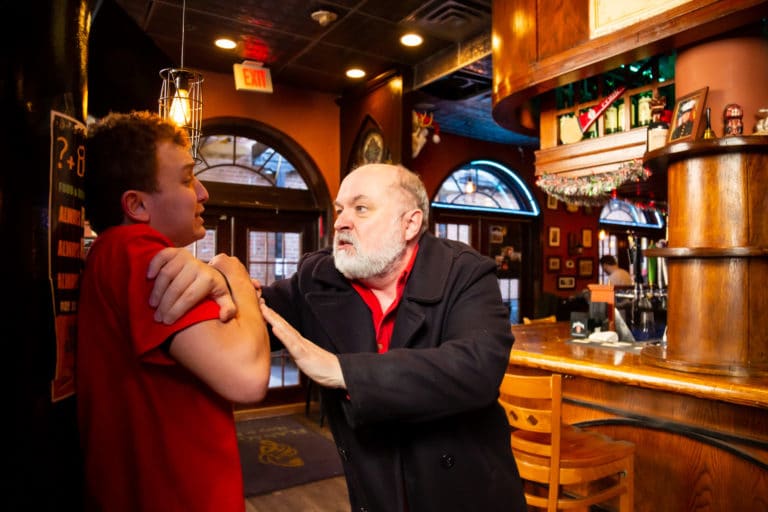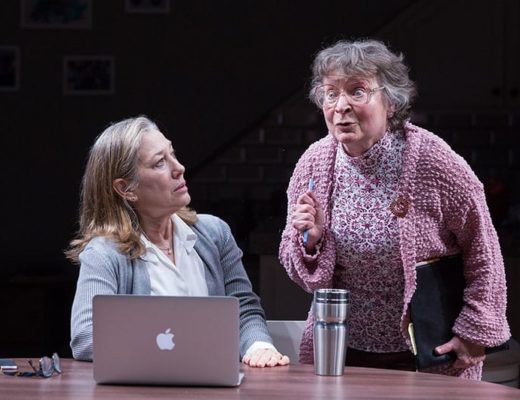By Julian Oquendo
This article was first published January 20, 2020 in DC Theatre Scene here.
There is something very refreshing about being an audience to theatre outside of a theater. 4615 Theatre Company is proving, as did the bar hopping runaway hit The Smuggler late last year, that theatre works perfectly well when set in a bar or restaurant, park, library, or town square.
In this case, Measure takes over the historic Flanagan’s Harp and Fiddle in Bethesda, and the bar couldn’t be better prepared for this production. The efficiency of arriving a few moments earlier, grabbing a drink and a bite before the start of the show, and knowing that you’ve still only spent a fraction of what a night out to the theatre in DC would cost, makes me wonder why more restaurants and theater companies aren’t capitalizing on this practice.
Measure, written and directed by Joe Calarco, is a surprise addition to 4615’s third season. Calarco told DCTS that he wrote the play in the years following a harrowing South Florida case where three teenagers doused Matthew Brewer in alcohol and set him on fire. Brewer survived, but the case made national headlines and became a national talking point on how, as a nation, we handle bullies and abuse. While it helps to go into this play knowing about the case, the play isn’t about Brewer. It’s about the bully who lit the match.
Specifically, it’s about one of the bullies, Derek (Ethan Miller) and the recently discharged, traumatized soldier Buddy (Scott Ward Abernethy) who hides Derek in his father’s bar in the days after the crime.
Miller performs the role of Derek with a frenetic energy, moving and weaving through the bar and audience like a trapped, but ultimately terrified tiger. He’s living in fear of Buddy, his shelter and, technically, his captor. Miller shows us Derek as Calarco wrote him: gross, maybe drug-fueled and desperate, a kid hoping to run away from his consequences.
Abernethy is outstanding as Buddy. His embodiment of physical and emotional PTSD are reflected in a limp to his right leg, in how his shoulders slump or grow at the call to violence. You see in his body a weight getting lifted when he sees a solution that violence might resolve, and you see that weight falling back when he weighs the consequences of his actions. This is his drive, and, to avoid spoilers, I will only say that Abernethy wonderfully portrays the desire to keep that weight off other people.
Miller and Abernethy’s performances, when they’re staged together, within a foot of audiences, drive home the proximity to violence we are witnessing. When Derek holds a bat over Miller’s head, when you can feel the venue rock as one actor is shoved against the bar, we, the audience, feel a little closer to their tensions and fears.
Nick Torres (Teddy) also shines as Buddy’s father, and aging bar owner, struggling with signs of early dementia. There is a heart-wrenching moment in the play when Buddy needs to remind him which son Teddy is remembering. There are other moments that feel off, and are maybe just clues to the emerging sickness: he quietly struggles to remember where he keeps the beer glasses, he thinks the bar is out of scotch when there’s a bottle present on the bar’s rail (accident or no? I wasn’t sure). Although Torres’ performance is exceptional, his character does seem to operate only as back story to drive Buddy’s emotional landscape.
Measure feels like a narrative from another era, when we could still pretend that bullies and abusers don’t win in the end. (Ha!) That empathy and a hug were the solutions needed to put a bow tie on our darkest emotions. It’s just hard to empathize when, in today’s era, you almost suspect Derek and Buddy’s actions would be forgiven with a pardon.
This play isn’t for you if you’re squeamish to violence. Calarco, in his writing and direction, effectively portrays the traumas and broken natures of these characters, and delivers back story via audio from the news coverage of Miller lighting his victim on fire. There’s a particularly jarring scene where we hear audio from Buddy’s time in the military.
The setting is perfect, and, saying that, I apologize to set designers everywhere. Harp and Fiddle serves as a great backdrop to immerse yourself in this world Calarco has built. (This is the first time Measure, set in a bar, has been produced in one.) The wafts of what I found to be a damn good burger and decent fried food coming from the kitchen build an atmosphere that can’t be replicated on a stage. Thirty-five years of beer soaking into the bar can evoke feelings of previous generations and the sadness of missing memories. The clink of bar glasses, the part of the floor that needs repairs, all serve to the play’s setting of a fragile world that will struggle to get fixed.
A Measure of Cruelty will perform for one more weekend on the 25th and 26th. Their early matinee shows are perfect for a lunch and theatre experience, with time left over to find things to do for the rest of the day. (There are other events happening at Harp and Fiddle on the same days that weekend.) There are audiences hungry for this type of theatrical event. Perhaps you are one of them.





No Comments